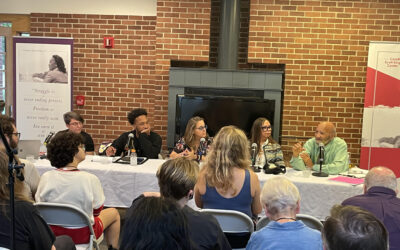Antioch College has named Juneteenth an official holiday to be observed annually by the College community.
What is Juneteenth?
Juneteenth—a combination of “June” and “nineteenth”—is a holiday which recognizes when the Union army arrived in Galveston, TX, on June 19, 1865, to announce that all enslaved Africans in the state were free in accordance with President Abraham Lincoln’s Emancipation Proclamation.

Official Juneteenth flag
Abraham Lincoln’s Emancipation Proclamation & General Order No. 3
This Proclamation was issued on January 1, 1863, and declared “that all persons held as slaves” within the rebellious states “are, and henceforward, shall be free.” This meant that the proclamation only applied to states that had seceded from the United States, leaving slavery intact in border states and in Southern states which were under Northern control. Additionally, Abraham Lincoln’s promise of the abolishment of slavery was contingent on the Union Army winning the Civil War, which didn’t happen until April 1865.
Texas is recorded as being the last state in the Confederacy to receive news that the Civil War had ended and that slavery had been abolished. At the time, approximately 250,000 people were still being held in slavery. This is where the recounts of history becomes obscured.
Various online articles explain that on June 19th, Union troops led by Major General Gordon Granger arrived in Galveston, Texas to announce that the war had ended and that all enslaved Africans were now free. Granger delivered General Order No. 3, which states
“The people of Texas are informed that, in accordance with a proclamation from the Executive of the United States, all … (enslaved Africans) are free. This involves an absolutely equality of personal rights and rights of property between former masters and (enslaved Africans), and the connection heretofore existing between them becomes that between employer and hired labor.”
But according to Kevin McGruder, Vice President of Academic Affairs and Associate Professor of History at Antioch, the full history is often overlooked. He explains that the telegraph, a device capable of sending coded signals over distance,
“had been in wide use during the Civil War providing for close to instantaneous communication regarding war events, including the end of the war. Because of this, White people in power in Texas knew that the war had ended, most likely directly after the April 9, 1865 meeting at which Robert E. Lee surrendered to Ulysses S. Grant.”
Why is Juneteenth Important?
The importance of Juneteenth, as McGruder states, is that
“it recognizes that white slaveholders chose to withhold the information of the end of the war from the enslaved people so that they could eke out the last bits of free labor. Most enslaved people would have understood that a Union victory meant the end of slavery, but rather than react to this betrayal by seeking retribution and revenge, the formerly enslaved people in Texas chose to move forward, and not dwell on what had been taken from them, but instead celebrate what they had – – – freedom.”
Juneteenth has been celebrated as early as 1866 to commemorate the end of slavery, and after the Great Depression, Black families emigrated from the South, and observance of this celebration spread throughout the country. Shortly after Martin Luther King Jr.’s assassination in 1968, his Poor People’s Campaign held a Juneteenth Solidarity Day which gave the holiday a new prominence in the civil rights movement.
In light of the Black Lives Matter movement, it’s more important than ever to know the history of Juneteenth. Most people are familiar with the celebration and history behind July 4th. However, when the United States became free from British Colonial Rule and the Declaration of Independence was signed in 1776, slavery still existed in America and therefore, the Fourth of July has always felt slightly tainted for many in the Black community.
At its heart, Juneteenth is a day of celebration but it is also a day to observe the holiday in reflection and in action.
The National Museum of African-American History & Culture invites you to engage in this history by “bringing the Museum to you through presentations, stories, photographs, and recipes from the Sweet Home Café.”
The National Museum of African-American History & Culture – “Juneteenth: A Celebration of Resilience” has been generously supported by The William R. Kenan, Jr. Charitable Trust.
How can you celebrate Juneteenth?
This year, the annual celebration of freedom comes as the country grapples with its long-standing history of systemic racism, as well as the fate of its Confederate monuments, flags, and symbols amid nationwide protests against police brutality and racism after the death of George Floyd.
Typically, Juneteenth is celebrated with educational activities for children, parades, concerts, beauty pageants, and readings of the Emancipation Proclamation. At cookouts, you can find red food and drink, such as strawberry soda and red velvet cake. The color red symbolizes that “from the middle passage to George Floyd, our blood has been spilled across America.”
Due to COVID-19, celebrations will look a little different this year: many events will be live-streamed online, gatherings can still take place but social distancing guidelines must be followed and masks must be worn.
Attend a virtual event:
Juneteenth, 10 Virtual, In-Person Events Happening Across the Houston Area
The World’s First Virtual Global Freedom Festival
List, Online: Virtual Juneteenth Celebrations

Header Image: 1900 Juneteenth celebration at Eastwoods Park, Austin, TX. Credit Grace Murray Stephenson, Austin History Center.



